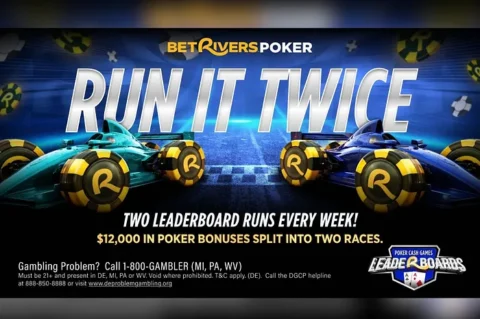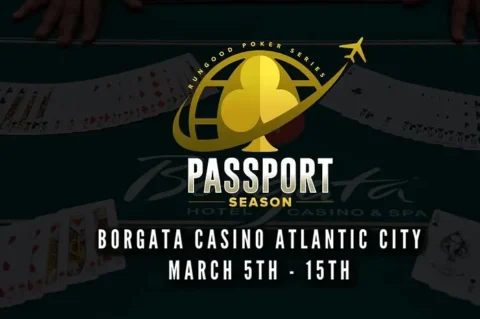Poker and politics share quite a few similarities between them: from bluffing against opponents to starting all over once a hand (or campaign) concludes.
There are also plenty of concepts, methodologies, and learning opportunities that arise from participating in either activity.
In this article, we’ll dive into how poker and politics are similar as well as explore some of the key differences in the ways that poker players and politicians improve their respective crafts.

Poker and Politics: The Concept of Winning and Losing
One of the most basic similarities between poker and politics is the concept of winning versus losing. When a poker hand concludes, assuming no chopped pot, there is one player who is awarded the pot, while the rest of the players who participated in and contributed money into the pot lose something of value.
This can be compared to a political election in which two or more political hopefuls compete for a sole position. The winner is elected to the position while all other contestants do not obtain the office they were pursuing.
There can be scenarios in poker and politics in which a player or contestant goes “from hero to zero” (and vice-versa) in a very short period of time. Without singling out a specific event, be it political or during a poker game, we can make use of the past and past progressive tenses to provide examples of this occurring.
The politician was leading in the polls, but then a major gaffe on the campaign trail (or public revelation linked to that candidate’s past behavior) led to that politician falling sharply in the polls and subsequently dropping out of the race altogether.
Poker player ‘A’ was the overall chip leader going into Day 2 of the tournament. But upon losing three all-in pots, player ‘A’ was eliminated from the tournament and did not collect a prize because he/she failed to survive the bubble.
Measuring Time in Poker and Politics
Providing examples for how poker and politics are equal in terms of timing may prove to be somewhat difficult.
While we DO know that timing is crucial for both activities, there may not be a precise timing comparison between a poker session and a political campaign.
And while serious poker players are often drilled on the concept that one’s competitive play is part of a lifelong session, the same may not be true for a politician. A politician may “move on” to another endeavor if unsuccessful or transition to another personal/professional role upon retiring or failing to get reelected.
Perhaps the best measurement to use, when attempting to draw similarities between the two activities, would be one poker session and one day of campaigning… but I wouldn’t say that these two time frames equate in an exact manner.
Mechanics in Poker and Politics
Mechanics, in terms of poker strategy, can be roughly defined as one’s mathematical knowledge of the game/scenario plus that individual’s physical capacity to make use of said knowledge in a real time environment.
Laying down (folding) 3-2 offsuit in a 10-handed ring game when faced with a re-raised, preflop pot is just as “mechanical” as calling off a sole, $0.05 remaining chip from the Big Blind in a $10/$20 cash game when faced with one or more preflop “all-in” shoves.
These poker actions (and the knowledge that justifies them) are mechanical in nature; similar to the mental calculus that might play itself out within a politician’s mind when deciding whether to host a fundraiser dinner for 100 wealthy donors versus catering-in 100 meals for homeless constituents.
In the abstract, we can shift this concept of mechanics over to traditional sports — where one’s practiced, muscle-memory footwork may be just the right skill (at just the right time) to put the finishing touches on an “alley-oop” in basketball, to drive a header between the goalposts in soccer, to rob a batter of a would-be home run in baseball, etc.
A live broadcast anchor — knowing that a hard (mandatory) commercial break is coming in five seconds — may opt for a quick “teaser” statement that hints at the next segment’s content rather than delve into a full, comprehensive review of what’s been covered so far.
Poker players, politicians, on-air personalities, (and sports athletes, for that matter) acquire learned “mechanics” and techniques that can be applied in everyday situations or under extraordinary circumstances — in a way that (they hope) enables them to arrive at an outcome that is satisfactory/advantageous/successful.
Capturing Hearts & Minds in Poker and Politics
There are some similarities between poker marketing and political campaigns, especially when it comes to capturing the hearts and minds of fans and/or supporters.
Being able to influence others’ perception of reality, either directly or indirectly, can significantly alter probabilities of success and failure.
In the political realm, this concept is hopefully the result of an ability to communicate ideas in a way that doesn’t ridicule or insult others’ perception.
For poker, perhaps one example of how marketing has driven growth for certain parts of the industry would be the global poker staking marketplace.
While it’s publicly claimed that the marketplace has been underwater for more than a decade, the poker staking market still somehow manages to deliver player-friendly markups that fuel its economy while maintaining thousands of poker hopefuls in action.
The result is a somewhat begrudging acceptance of (and willingness to promote) higher markups by some — but not all — poker players and industry representatives. And the survival of such an initiative relies upon a fair amount of goodwill, positive encouragement, and lack of visceral confrontation in order to endure.
However, in some competitive activities, changing others’ perception of reality to achieve success can be an end that justifies the means of pressuring and bullying.
One example of an opponent being purposefully and strategically “bullied” might be the delayed ring entrance of then-undefeated heavyweight boxer Michael Spinks leading up to his first round knockout at the hands of Mike Tyson in June 1988.
A title bout that Tyson arguably won before the combatants left their respective locker rooms.
The Manipulation of Opponents and/or Teammates
Publishing a grid that plots the exact whereabouts of marketing initiatives on scales of morality and ethics (and advertising such a grid as “useful” in any way) might be an act that’s way too susceptible to subjectivity/personal biases.
Yet, there are examples of manipulation that persist in today’s society: both in poker and politics.
- The disproportionate “cause and effect” relationship between a politician and constituent; one that results in obtaining a vote based on a promise that fails to materialize.
- The culturally taboo edge that a famous poker player might receive just by endearing him/herself to (or even insulting) an opponent who’s only too eager to see one’s own chips make their way into an icon’s stack.
- The two-foot putt for the win that doesn’t reach the cup on the 18th Hole of a major championship; the errant shot that misses its mark when the goalie is hopelessly out of position; the bobbling of a routine pop-up; the stumble before the goal line.
These occurrences — often referred to as mental lapses — may serve as examples of altered (manipulated) perceptions in action. In some cases, the manipulation may be triggered solely by the perceived weight of a situation; without any prompting from teammates or opponents.
So while you can’t hurl yourself into an NFL defensive lineman’s physical space before the snap (that would result in a False Start penalty). And while you can’t take the ball away from an NFL nose guard’s hands a split-second before the play begins (that would be penalized as a Neutral Zone infraction), you can actively influence (provoke) an involuntary, subconscious state based on a friend or foe’s perception of reality.
It’s the stuff social psychologists’ dreams are made of — psychological inputs that result in physiological outputs.
Now… the mechanical act of blowing hot air (physically or virtually) may result in unintended consequences if the “transmitter” possesses incomplete data, is unprepared, or hasn’t laid the appropriate groundwork required to encourage the desired output on behalf of the “receiver.”
The difference between a pitch-perfect whole note and a breathless, out of tune B-flat — performed by a second or third party — that gets tooted through a bass instrument, is analogous to having “hit the books” or “called it in” when implementing one or more measures designed to psych-out an opponent (or create an ideal environment for the enhancement of a colleague’s performance).
Decision Making Depth: The Introduction of More Variables
For the sole purpose of this article, let’s define decision making “depth” as the introduction of more variables into an equation.
With that clarified, let’s now consider a couple of commonly-used variables that might be incorporated into the decision making process for poker and politics.
In poker, knowledge of a player’s own, face-down hole cards represents an extremely important variable.
Yes, there IS a documented 2007 “novelty” instance in which Annette Obrestad won an online poker tournament without looking at her own hole cards. But knowing one’s hole cards is still considered to be vital information; data that can (and should) be inserted into any player’s decision making process when competing in real money games.
Perhaps this is why the term “blind” in poker can describe not only the forced bets before a hand begins in community card games, but also a player’s actions when making decisions at the poker table without looking at one’s own hole cards.
“Player ‘A’ went all-in blind.” This means that the player performed a poker action without looking at his/her own hole cards, or before witnessing outcomes from one or more phases during a specific poker hand.
Another common way of describing this sort of poker action is to use the prepositional phrase “in the dark.”
“Player ‘B’ checked in the dark.” This means that the player has committed to a specific action for a subsequent betting round/phase without being privy to the cards dealt (or ensuing betting activity) during that subsequent round.
Generally speaking, making a poker decision without considering any and all information that is provided via a hand’s natural progression is a bad idea. Doing so creates a provable disadvantage over the long term (although there may be circumstances in which a one-off decision of this nature provides the “transmitter” with a positive expectation).
A comparison of this poker-themed concept to the science/art of politics might be a current or aspiring lawmaker taking a public stance on (or voting for/against) a proposal without possessing any relevant knowledge on the matter.
Again, generally speaking, the act of actually reviewing the content contained within an individual proposal should — both in theory and in practice — grant a politician with a greater understanding (and corresponding ‘Yes/No’ discernment capacity) of how the proposed law(s) might impact affected parties.
But knowing one’s hole cards in poker and reviewing the literature in legislative proposals aren’t the only variables that can enhance one’s decision making depth when participating in said activities.
If you are currently a member of, or decide to subscribe to, one or more premium poker courses or poker training sites, take a moment to browse some of the instruction categories that will potentially introduce more variables into one’s strategy-based decisions.
You might see quite a bit of variable-specific coursework when subscribing to these services, including material related to individual poker variants like Texas Hold’em, broad concepts like poker tells, or distinct difficulty levels starting with low stakes poker games.
More on Political Decision-Making Depth
Just like poker, there are discipline-specific concepts that can be (but aren’t always) applied by political decision makers.
Following are a few basic examples of added variables, or questions, that might enhance a United States lawmaker’s decision making depth once the answers have been carefully studied and weighted.
LOCAL: A proposal to carry out a six-month construction project near a busy intersection
How much will this project cost local taxpayers? Will businesses in the immediate area suffer due to a lack of vehicular and/or foot traffic while the project is active? If the project includes building a “bypass,” will the end-product roadwork result in less regional tourism flow into local businesses?
What are the opinions of constituents who currently reside in, or travel through, the local area What are the anticipated pros and cons that voters are relaying to you when arguing either ‘Yes/No’ for the proposed initiative?
Did the proposal originate locally, or is its promotion being funded by non-local interests? If the latter is true, what “carrots” (incentives) are the non-local entities providing to benefit local interests?
What alternate lanes of transportation will be afforded to drivers and pedestrians while construction is ongoing? What are the anticipated inconveniences (or reduction in services) during the course of the project versus the anticipated conveniences (or increase in services) once the project has been completed?
Is the proposed location part of a large metropolitan city, suburban area, or rural zone? Is the land itself zoned (categorized) as residential, commercial, or industrial?
STATE: A proposal to require the use of seat belts by all passengers within a moving vehicle
How practical will it be to actually enforce such a law if passed? Will the state be entitled to (or be denied) federal funding if the legislative measure passes (or fails to pass)?
Are there any safety concerns associated with mandatory seat belt use by adult passengers who are positioned in the back seat(s) of a vehicle? How many serious injuries may be avoided if this proposal goes into effect?
NATIONAL: A proposal to eliminate the use of Daylight Saving Time (DST)
What are the media-communicated pros and cons of such a measure? How might different business sectors, educational institutions, personal leisure activities, and overall national culture be impacted?
Are there specific regions/groups that may disproportionately benefit/suffer upon eliminating the one-hour “Spring Forward” or “Fall Back” time change?
Note that it might be easier to identify variables on a local level due to the intimate familiarity a political decision maker may possess.
Perhaps this can be attributed to the relatively small geographic region or low number of individuals impacted when compared to state and federal issues.
The Intermingling of Poker and Politics
In this author’s opinion, the intermingling of poker and politics could represent a positive advancement for many in society. Especially for cases in which a clear, mechanical discernment can be achieved through the consideration and weighting of more variables.
On the other hand, achieving influence through altering the perception of others’ reality — at least in politics — (be that through bullying, manipulation, or “psyching-out” opponents) might be a concept best reserved for abstract, frequently scrutinized study materials, with the aim of preparing for emergency scenarios against real-life disasters and foes.
But don’t let that dissuade you from attempting to outplay your opponents in competitive environments!












